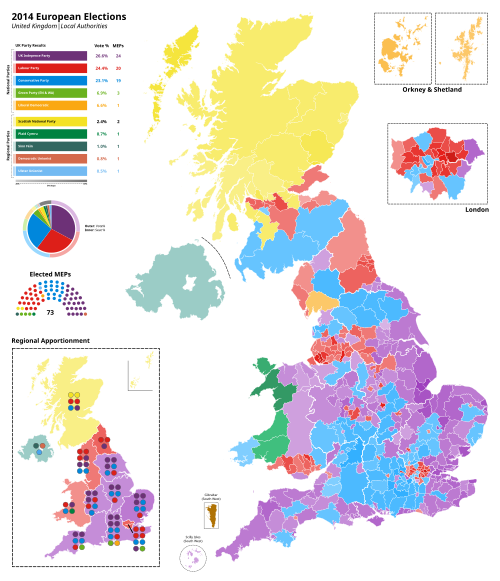| |||||||||||||||||||||||||||||||||||||||||||||||||||||||||||||||||||||||||||||||||||||||||||||||||||||||||||||||||
All 73 United Kingdom seats to the European Parliament | |||||||||||||||||||||||||||||||||||||||||||||||||||||||||||||||||||||||||||||||||||||||||||||||||||||||||||||||||
|---|---|---|---|---|---|---|---|---|---|---|---|---|---|---|---|---|---|---|---|---|---|---|---|---|---|---|---|---|---|---|---|---|---|---|---|---|---|---|---|---|---|---|---|---|---|---|---|---|---|---|---|---|---|---|---|---|---|---|---|---|---|---|---|---|---|---|---|---|---|---|---|---|---|---|---|---|---|---|---|---|---|---|---|---|---|---|---|---|---|---|---|---|---|---|---|---|---|---|---|---|---|---|---|---|---|---|---|---|---|---|---|---|---|
| Registered | 46,481,532 [n 1] | ||||||||||||||||||||||||||||||||||||||||||||||||||||||||||||||||||||||||||||||||||||||||||||||||||||||||||||||||
| Turnout | 35.6%[1] | ||||||||||||||||||||||||||||||||||||||||||||||||||||||||||||||||||||||||||||||||||||||||||||||||||||||||||||||||
| |||||||||||||||||||||||||||||||||||||||||||||||||||||||||||||||||||||||||||||||||||||||||||||||||||||||||||||||||
 Map of the 2014 European Parliamentary Election in the United Kingdom | |||||||||||||||||||||||||||||||||||||||||||||||||||||||||||||||||||||||||||||||||||||||||||||||||||||||||||||||||
 | |||||||||||||||||||||||||||||||||||||||||||||||||||||||||||||||||||||||||||||||||||||||||||||||||||||||||||||||||
| |||||||||||||||||||||||||||||||||||||||||||||||||||||||||||||||||||||||||||||||||||||||||||||||||||||||||||||||||
| Part of a series of articles on |
| UK membership of the European Union (1973–2020) |
|---|
 |
The 2014 European Parliament election was the United Kingdom's component of the 2014 European Parliament election, held on Thursday 22 May 2014,[2][3] coinciding with the 2014 local elections in England[4] and Northern Ireland. In total, 73 Members of the European Parliament were elected from the United Kingdom using proportional representation. England, Scotland and Wales use a closed-list party list system of PR (with the D'Hondt method), while Northern Ireland used the single transferable vote (STV).
Most of the election results were announced after 10pm on Sunday 25 May – with the exception of Scotland, which did not declare its results until the following day – after voting closed throughout the 28 member states of the European Union.
The most successful party overall was the UK Independence Party (UKIP) which won 24 seats and 27% of the popular vote, the first time a political party other than the Labour Party or Conservative Party had won the popular vote at a British election since the 1906 general election.[5][6] It was also the first time a party other than Labour or Conservative had won the largest number of seats in a national election since the December 1910 general election.[7][8][9] In addition, the 23.1% of the vote won by the Conservatives was the lowest recorded vote share for the party in a national election until 2019.
The Labour Party became the first Official Opposition party since 1984 to fail to win a European Parliament election, although it did gain 7 seats, taking its overall tally to 20. The governing Conservative Party was pushed into third place for the first time at any European Parliament election, falling to 19 seats, while the Green Party of England and Wales saw its number of MEPs increase for the first time since 1999, winning 3 seats. In Scotland, the Scottish National Party won the largest share of the vote, taking 29% of the vote and 2 MEPs. The Liberal Democrats, who were in government in the UK with the Conservatives at the time, lost 10 of the 11 seats they were defending, and won just 7% of the popular vote.
Figures released in December 2014 showed that the Conservatives and UKIP each spent £2.96m on the campaign, the Liberal Democrats £1.5m, and the Labour Party approximately £1m.[10]
Cite error: There are <ref group=n> tags on this page, but the references will not show without a {{reflist|group=n}} template (see the help page).
- ^ "Results of the 2014 European elections – Results by country – United Kingdom – European Parliament". europarl.europa.eu. European Parliament. Retrieved 11 July 2016.
- ^ "EU reschedules elections to boost turnout". United Press International. 11 March 2013. Retrieved 3 May 2013.
- ^ Staff writer (13 March 2013). "EU elections: Polling day will stay on Thursday, insists government". BBC News. Retrieved 3 August 2013.
- ^ "Wards and Election Information". Elmbridge.gov.uk. Elmbridge Borough Council. Archived from the original on 16 December 2013. Retrieved 19 April 2013.
- ^ "Ukip and Front National lead populist earthquake". Financial Times. 26 May 2014. Retrieved 31 May 2014.
- ^ "European Elections: UKIP Tops British Polls". Sky News. 26 May 2014. Retrieved 31 May 2014.
- ^ "UK's Eurosceptic UKIP party storms to victory in Europe vote". Reuters. 26 May 2014. Archived from the original on 1 June 2014. Retrieved 31 May 2014.
- ^ "10 key lessons from the European election results". The Guardian. 26 May 2014. Retrieved 31 May 2014.
- ^ "Lurching Right: UKIP Win Creates Pressure for Cameron and Europe". Der Spiegel. 27 May 2014. Retrieved 31 May 2014.
- ^ Billy Kenber (18 December 2014). "Ukip matched spending by Tories on EU elections". The Times. Retrieved 18 December 2014.
Cite error: There are <ref group=lower-alpha> tags or {{efn}} templates on this page, but the references will not show without a {{reflist|group=lower-alpha}} template or {{notelist}} template (see the help page).





